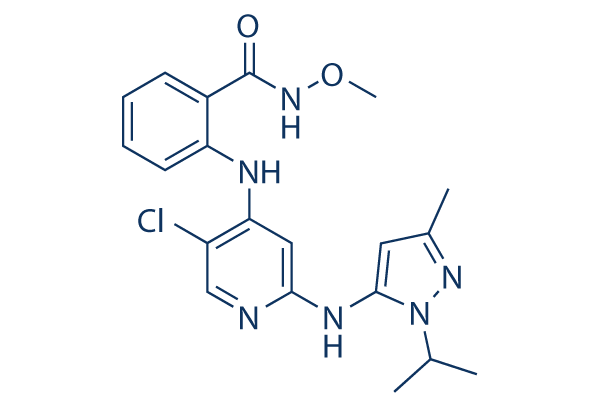All AbMole products are for research use only, cannot be used for human consumption.

In vitro: GSK2256098 has been developed to inhibit FAK activity through targeting the phosphorylation site of FAK, tyrosine (Y) 397. After a 30-min incubation, GSK2256098 inhibits FAK activity or Y397 phosphorylation in cancer cell lines, OVCAR8 (ovary), U87MG (brain), and A549 (lung), at IC50 values of 15, 8.5 and 12 nM, respectively. In addition, the data suggests that cellular inhibition of FAK by GSK2256098 can occur as early as 30 min in cultured cells and lasts up to 12 hours in mouse tumor xenografts. GSK2256098 inhibition of FAK kinase activity can decrease Akt and ERK activity. PI3K/Akt and ERK signaling contributes to cell survival, implying a pharmacological value of GSK2256098 in attenuation of abnormal survival pathways in specific types of PDAC cells. GSK2256098 can promote apoptosis in L3.6P1 cells through caspase-9/PARP-related pathways. It attenuates abnormal growth and aberrant motility of PDAC cells in a FAK specific manner. GSK2256098 also inhibits growth, migration, and invasion and induces apoptosis in a subset of GBM cell lines.
In vivo: Pharmacokinetic (PK) studies in mice and rats with an intact blood brain barrier indicate that the penetration of GSK2256098 into the CNS is poor. However, it achieves concentrations in tumor of patients with GBM(glioblastoma) exceeding those associated with preclinical activity. GSK2256098 has an acceptable safety profile, has evidence of target engagement at doses at or below the MTD (maximum tolerated dose), and has clinical activity in patients with mesothelioma, particularly those with merlin loss. In the Ishikawa orthoptopic murine model, treatment with GSK2256098 results in lower tumor weights and fewer metastases than mice inoculated with Hec1A cells. Tumors treated with GSK2256098 have lower microvessel density (CD31), less cellular proliferation (Ki67), and higher apoptosis (TUNEL) rates in the Ishikawa model when compared to the Hec1a model. GSK2256098 may be therapeutically beneficial to patients with PTEN-mutant uterine cancer, and PTEN represents a potential predictive biomarker.
| Cell Experiment | |
|---|---|
| Cell lines | PDAC(pancreatic ductal adenocarcinoma) cells |
| Preparation method | PDAC cells are cultured on a 6-well plate. When cell confluence reachs about 70% in regular medium, the cells are incubated in the medium containing 0.1-10 μM GSK2256098 for 48 or 72 hr. At the end of treatments, cells are re-seeded and kept for 9 d Then, the cells are stained using Clonogenic Reagent, and the blue colonies are counted. |
| Concentrations | 0.1–10 μM |
| Incubation time | 48 or 72 h |
| Animal Experiment | |
|---|---|
| Animal models | Nude mice without thymus |
| Formulation | |
| Dosages | 75 mg/kg |
| Administration | oral |
| Molecular Weight | 414.89 |
| Formula | C20H23ClN6O2 |
| CAS Number | 1224887-10-8 |
| Solubility (25°C) | 82 mg/mL in DMSO |
| Storage |
Powder -20°C 3 years ; 4°C 2 years In solvent -80°C 6 months ; -20°C 1 month |
| Related FAK Products |
|---|
| Petunidin chloride
Petunidin chloride is an O-methylated anthocyanidin derived from delphinidin. *The compound is unstable in solutions, freshly prepared is recommended. |
| FAK-IN-11
FAK-IN-11 is a FAK inhibitor. |
| ZINC40099027
ZINC40099027 is a FAK activator. |
| FC-11
FC-11 is a PROTAC FAK degrader (DC90: 1 nM) . |
| FAK-IN-9
FAK-IN-9 is a potent and orally active FAK inhibitor with an IC50 of 27.44 nM. |
All AbMole products are for research use only, cannot be used for human consumption or veterinary use. We do not provide products or services to individuals. Please comply with the intended use and do not use AbMole products for any other purpose.


Products are for research use only. Not for human use. We do not sell to patients.
© Copyright 2010-2024 AbMole BioScience. All Rights Reserved.
